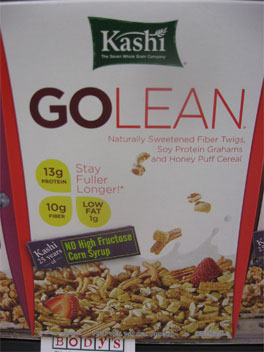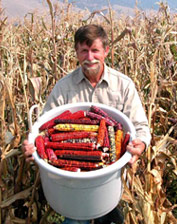Experts say “natural” should mean non-GMO
By Ken Roseboro
Published: November 1, 2011
Category: GMO Comtamination

Kashi “natural” cereal tested to 100% GMO
Should “natural” mean non-GMO? A class action lawsuit against ConAgra for claiming that its Wesson canola oil is natural when it is made from genetically modified canola is bringing this question to the forefront.
The Cornucopia Institute added fuel to the controversy with a recent report (see below) revealing that cereal products labeled “natural” contained high levels of GMOs.
John F. Banzhaf, a professor of public interest law at George Washington University Law School, says the ConAgra lawsuit could open the floodgates to similar litigation against other companies making “natural” claims on products that contain GM ingredients.
No government regulation; NPA developing standard
The number of potential lawsuits is huge. According to an NBC News report, the number of foods claiming to be natural has increased 69.4% to 12,271 from 2005 to 2010—and an estimated 70% of processed foods contain GM ingredients.
There are increasing calls for the US government to regulate the “natural” label claim.
The FDA doesn’t restrict the use of the term “natural” except on products that contain added color, synthetic substances, and artificial flavors.
“The FDA isn’t addressing (concerns surrounding the natural label) at all,” says Cara Welch, vice president, scientific & regulatory affairs at the Natural Products Association (NPA). “The market has free reign over the use of the ‘natural’ label and it has come back to bite ConAgra.”
In response to the lack of oversight, NPA is developing its own standard for natural claims on food products that it plans to introduce in 2012.
NPA has already developed standards for natural personal care and home care products.
“We are trying to get food manufacturers and suppliers to discuss what is possible. We also want input from retailers who are in direct contact with consumers,” Welch says.
She predicts that there will be a lot of interest among food manufacturers to certify their products as natural because of the growing controversies over unregulated natural claims.
NPA hasn’t yet decided whether non-GMO assurance will be part of the standard though Welch says GMOs “will be a topic of discussion. There’s a subset of Americans who reject GMOs being called natural,” she says.
Non-GMO “is where we are headed as an industry”
Dave Foreman, co-founder and president of Beanitos, a snack food manufacturer says “non-GMO should be the minimum ‘cost of admission’ for a product to be labeled ‘natural.’”
Beanitos puts its bean-based chips through the Non-GMO Project verification.
Foreman sees the natural food industry moving to a non-GMO requirement. “That’s where we are headed as an industry,” he says.
Foreman cites natural food retailers such as Jimbo’s in Southern California that are becoming more strict about requiring that products sold in stores be non-GMO. In Canada, Nature’s Fare Markets requires that manufacturers provide documented proof that a product is non-GMO when the product contains ingredients that could contain GMOs. United Natural Foods, the nation’s largest natural food distributor, is backing the Non-GMO Project and strongly encouraging natural food manufacturers to become non-GMO verified. Whole Foods Market is putting its private label products through the Non-GMO Project verification and requiring its suppliers to be verified also.
Foreman even foresees a special section designated for Non-GMO Project verified companies at Natural Products Expo East and West, the two main US natural food tradeshows. “If they did that, ultimately the whole show would be non-GMO,” he says.
Steve Taormina, standards director for New Hope Natural Media, which organizes the Expos, says his group has no official position on GMOs and “natural” claims other than listing “GMO Sugar” as an unacceptable ingredient.
When asked to comment on a Non-GMO Project verified section at the tradeshows, Taormina says, “We think this a valid concept that is worthy of consideration, but the decision would be made by the tradeshow directors.”
“Extreme importance to require non-GMO verification” for natural
Other industry members say non-GMO should be a requirement for natural products.
Tofu manufacturer Pulmone Foods USA issued “All Natural” principles that describe its commitment to avoiding the use of artificial preservatives, chemicals, additives, and flavors as well as adherence to the Non-GMO Project verification program.
“I believe it’s of extreme importance to require non-GMO verification for any products labeled as ‘natural,’” says Kim Davidson, president and co-owner, Davidson Commodities. “The term ‘natural’ is nothing more than greenwashing. Requiring non-GMO verification provides consumers the assurance that they know what they’re buying.”
Lynn Clarkson, president, Clarkson Grain, a supplier of organic and non-GMO grains, agrees. “I would make non-GMO a part of any natural marketing standard.”
Clarkson believes the organic label “remains the gold standard for avoiding GMOs.”
One natural food retailer says non-GMO assurance should be a requirement for a company to label their products as natural, but only when a product contains ingredients with GMO risks.
“Ideally we would like to see a universal logo (similar to the Non-GMO Project logo) included on packages of products that have made this grade and regulations in place to enforce testing and full disclosure,” says the retailer, who asked to remain anonymous.
“To use the “natural” label, I think there should be some assurance that products contain less than 2.0% GMO,” says Maury Johnson, president, Blue River Hybrids, an organic seed company.
Frito Lay and Safeway say “natural” doesn’t equal GMO
Two industry giants, snack food manufacturer Frito Lay and retailer Safeway, also both define natural as non-GMO.
Frito-Lay says that its natural line of snacks, including Lay’s Tostitos and Sunchips, do not contain GM ingredients though their products are not being verified non-GMO.
Safeway also says it doesn’t use GM ingredients in its Open Nature line of natural products. Open Nature cereals and granolas are promoted as “made without GMOs” on Safeway’s website.
Mandatory GM food labeling the best solution
Several industry experts say mandatory GM food labeling is the best solution. “Everything GMO should be labeled, and thus the public will have a choice on what they consume and are not in the dark with the whole ‘natural’ scenario,” says Toby Gamberoni, sustainability officer, Coconut Bliss.
“I would prefer that the government simply mandate that all the information with regard to genetic modification simply be disclosed in a prominent way on the package. Then consumers can decide for themselves if they think it is natural or healthy,” says Michael Smulders, president, Bakery On Main, a manufacturer of gluten-free granola.
Dave Foreman agrees. “If we had mandatory labeling, everything else would fall into place and that would spell an end to GMOs in our food supply.”
© Copyright The Organic & Non-GMO Report, November 2011





